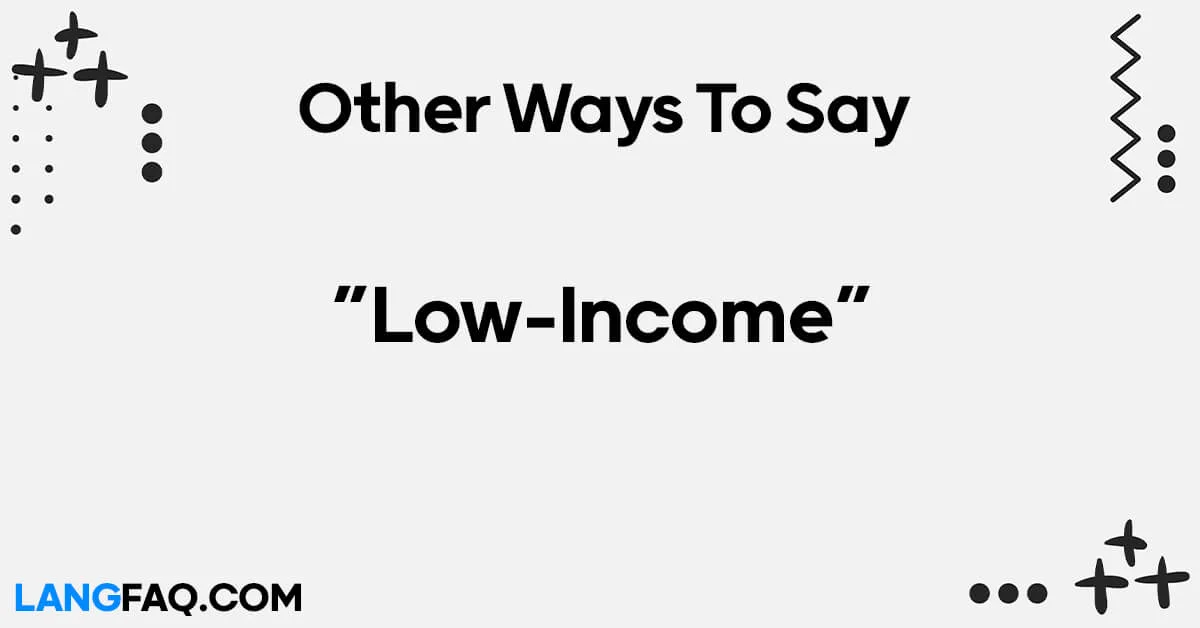Navigating the intricate landscape of financial discussions often involves the nuanced use of language. In this article, we delve into the various ways to express the concept of “Low-Income,” shedding light on alternative phrases that encapsulate different facets of financial situations. From colloquial expressions to formal terms, this guide aims to enrich your vocabulary and understanding of economic discussions.
12 Other Ways to Say “Low-Income”
Here are 12 alternative ways to express “Low-Income”:
- Limited Financial Means
- Modest Income
- Economically Disadvantaged
- Financially Strained
- Underprivileged
- Financially Challenged
- In a Tight Financial Spot
- Living on a Tight Budget
- Facing Economic Hardship
- Struggling Financially
- In a Financial Bind
- Experiencing Fiscal Constraints
Here’s a table with meanings and examples for the alternative ways to express “Low-Income”:
| Expression | Meaning | Example Sentence |
|---|---|---|
| Limited Financial Means | Having a restricted amount of financial resources. | “Due to the medical bills, they found themselves with limited financial means.” |
| Modest Income | Earning a moderate amount, sufficient for basic needs. | “She has a modest income that covers her necessities comfortably.” |
| Economically Disadvantaged | Facing challenges in accessing resources and opportunities. | “The economically disadvantaged community lacked access to quality education.” |
| Financially Strained | Experiencing pressure in managing day-to-day expenses. | “The unexpected expenses left them financially strained this month.” |
| Underprivileged | Lacking privileges and resources for a comfortable life. | “Supporting underprivileged children ensures they have equal opportunities.” |
| Financially Challenged | Dealing with obstacles in managing finances effectively. | “The job loss left them financially challenged, requiring a reassessment of their budget.” |
| In a Tight Financial Spot | Being in a temporary or prolonged period of financial difficulty. | “After the car breakdown, they found themselves in a tight financial spot.” |
| Living on a Tight Budget | Practicing conscientious spending to make ends meet. | “They are currently living on a tight budget to save for future goals.” |
| Facing Economic Hardship | Encountering adversity in maintaining a stable financial footing. | “Many families are facing economic hardship due to the economic downturn.” |
| Struggling Financially | Finding it challenging to cover essential expenses. | “After the job loss, they have been struggling financially to meet their obligations.” |
| In a Financial Bind | Being in a situation where economic circumstances pose constraints. | “Investing without proper knowledge can put you in a financial bind.” |
| Experiencing Fiscal Constraints | Encountering limitations in managing financial resources. | “The small business is experiencing fiscal constraints, impacting its expansion plans.” |
This table presents a spectrum of expressions to articulate the concept of “Low-Income.” Each phrase carries its own nuanced meaning, offering a diverse vocabulary to accurately depict various financial situations. By understanding these alternatives, we enrich our ability to communicate effectively and empathetically about economic challenges, fostering a more comprehensive dialogue on financial well-being.
Is It Correct to Say “Low-Income”?
Certainly! The term “low-income” is correct and widely used to describe individuals or households with limited financial resources. It is commonly employed in various contexts, including government reports, social programs, economic discussions, and everyday conversations.
Usage Tips:
- Formal Reports and Policies: In formal documents, such as government reports or policy documents, “low-income” is a standard and accepted term. For instance, “The government has implemented programs to support low-income families.”
- Social Programs and Aid: Organizations and initiatives aimed at assisting financially disadvantaged individuals often use “low-income” to define their target demographic. For example, “This scholarship is designed for students from low-income backgrounds.”
- Economic Discussions: In economic discussions or analyses, the term is frequently utilized to refer to a specific income bracket. For instance, “The study focused on the impact of inflation on low-income households.”
- Everyday Conversations: In casual conversations, “low-income” is a clear and easily understood way to convey a certain financial status. For example, “Living in a low-income neighborhood can present unique challenges.”
Grammar and Usage Rules:
- Hyphenation: Note that “low-income” is hyphenated when used as an adjective. For instance, “She works with low-income communities.”
- Noun Usage: As a noun, “low income” without the hyphen can also be used, as in “They fall into the category of low income.”
Pros:
- Clarity: “Low-income” provides a clear and concise way to communicate the financial status of individuals or groups.
- Accepted Terminology: It is widely accepted in both formal and informal settings, making it a versatile term.
Cons:
- Potential Stigma: Some argue that the term may carry a certain stigma or negative connotation. In such cases, alternative phrases like those mentioned in the article can be used to provide more nuanced and empathetic descriptions.
Professional Mail Example With “Low-Income”
Subject: Proposal for Low-Income Housing Initiative
Dear [Recipient’s Name],
I trust this email finds you well. My name is [Your Name], and I represent [Your Organization], a non-profit dedicated to community development and affordable housing solutions.
I am reaching out to discuss a potential partnership in addressing the pressing issue of housing affordability in our community. Our organization has been diligently working towards providing sustainable housing solutions for low-income individuals and families, and we believe that collaboration with [Recipient’s Organization] could significantly amplify our impact.
Our proposal outlines a comprehensive plan to develop affordable housing units, ensuring that individuals from low-income backgrounds have access to safe and quality living spaces. This initiative aligns with the core values of both our organizations and holds the potential to make a lasting difference in the lives of many community members.
Key Points of the Proposal:
- Affordable Housing Construction: We propose the construction of [X number] of affordable housing units tailored to the needs of low-income individuals and families.
- Community Engagement: Our plan includes community engagement programs to empower residents, fostering a sense of ownership and pride within the community.
- Sustainable Development: We are committed to incorporating sustainable building practices, ensuring long-term cost-effectiveness and environmental responsibility.
- Financial Assistance Programs: To further support those in low-income brackets, our proposal includes financial assistance programs to facilitate access to these housing units.
- Collaborative Outreach: We envision collaborative outreach efforts to raise awareness about the importance of affordable housing and garner community support for the initiative.
I am attaching a detailed copy of our proposal for your perusal. We believe that together, we can make a significant impact on the housing crisis faced by low-income individuals in our community.
I would greatly appreciate the opportunity to discuss this proposal further at your earliest convenience. Please let me know a time that suits you, and we can arrange a meeting to explore the potential for collaboration.
Thank you for considering our proposal, and I look forward to the possibility of working together to create positive change in our community.
Best regards,
[Your Full Name] [Your Position] [Your Contact Information] [Your Organization]
Limited Financial Means
Navigating life with limited financial means requires a strategic approach to budgeting and resource allocation. This phrase encompasses a situation where individuals find themselves with a restricted amount of financial resources, limiting their capacity for discretionary spending or savings.
Usage Tips:
- Formal Context: In a professional setting, one might say, “Given our limited financial means, we need to prioritize cost-effective strategies for the upcoming project.”
- Informal Context: In a casual conversation, it could be expressed as, “We’re working with limited financial means this month, so let’s opt for a budget-friendly outing.”
Example Sentence: “Due to unforeseen medical expenses, our limited financial means this month require us to be more cautious with our spending.”
Variations:
- Limited Budget
- Financial Restraints
- Constrained Finances
Email Sample: Subject: Monthly Budget Discussion
Dear Team,
I hope this email finds you well. Given our limited financial means for the current quarter, let’s collaborate on finding innovative solutions that align with our budget constraints.
Best regards, [Your Name]
Modest Income
A modest income signifies a balanced yet moderate financial situation, where one’s earnings cover basic needs but may pose constraints when it comes to pursuing luxuries or substantial investments.
Usage Tips:
- Formal Context: Discussing salary expectations in a job interview, one might say, “While I have a modest income, I am confident in my ability to contribute significantly to your team.”
- Informal Context: Among friends, it could be expressed as, “I have a modest income, but I’ve learned to make the most of it by prioritizing my spending.”
Example Sentence: “Her modest income allowed her to lead a comfortable life, focusing on experiences rather than material possessions.”
Variations:
- Sufficient Salary
- Basic Earnings
- Middle-Class Income
Email Sample: Subject: Budget-friendly Event Suggestions
Hi Team,
Given our modest income for this quarter’s team-building event, let’s brainstorm ideas that align with our budget while ensuring a memorable experience.
Best, [Your Name]
Economically Disadvantaged
Being economically disadvantaged implies facing challenges in accessing resources and opportunities, highlighting disparities in financial well-being.
Usage Tips:
- Formal Context: Advocating for social change, one might say, “Addressing the needs of the economically disadvantaged should be a priority for government policies.”
- Informal Context: Discussing community support, it could be expressed as, “Our efforts aim to uplift the economically disadvantaged members of our neighborhood.”
Example Sentence: “The project focuses on providing educational resources to economically disadvantaged communities, aiming to break the cycle of poverty.”
Variations:
- Financially Underprivileged
- Socioeconomically Disadvantaged
- Those Facing Economic Hardships
Email Sample: Subject: Community Outreach Proposal
Dear [Recipient],
Our proposal outlines initiatives to support the economically disadvantaged in our community. Your insights on its feasibility would be highly valuable.
Kind regards, [Your Name]
Financially Strained
Individuals experiencing financial strain often feel the pressure of managing day-to-day expenses without much room for savings or discretionary spending. This situation requires careful budgeting and resource allocation to weather financial challenges.
Usage Tips:
- Formal Context: Discussing business finances, one might say, “The recent market fluctuations have left the company financially strained, necessitating a reassessment of our budget.”
- Informal Context: Among family members, it could be expressed as, “Given our financially strained situation this month, let’s prioritize essential expenses.”
Example Sentence: “Unexpected medical bills left them financially strained, prompting them to seek additional sources of income.”
Variations:
- Financially Stressed
- Tight Financial Situation
- Budget Pressures
Email Sample: Subject: Financial Update and Strategy Meeting
Hi Team,
Our financial report indicates that we’re currently financially strained. Let’s schedule a meeting to discuss strategies for the upcoming quarter.
Best, [Your Name]
Underprivileged
The term “underprivileged” describes individuals or communities facing economic hardships and lacking the resources and privileges that contribute to a more comfortable financial existence.
Usage Tips:
- Formal Context: Presenting a charitable initiative, one might say, “Our goal is to provide educational opportunities to underprivileged children, empowering them for a brighter future.”
- Informal Context: Among friends discussing volunteer work, it could be expressed as, “Let’s dedicate our weekends to support underprivileged families in our neighborhood.”
Example Sentence: “The foundation aims to bridge the educational gap for underprivileged youth, offering scholarships and mentorship programs.”
Variations:
- Socioeconomically Disadvantaged
- Financially Deprived
- Those with Limited Privileges
Email Sample: Subject: Volunteer Opportunity
Dear Team,
We have an upcoming opportunity to support underprivileged families in need. Your participation could make a significant impact.
Warm regards, [Your Name]
Financially Challenged
Being financially challenged implies grappling with obstacles in managing finances effectively, potentially leading to a lower standard of living.
Usage Tips:
- Formal Context: Discussing economic policies, one might say, “Implementing financial education programs is crucial for supporting the financially challenged segments of the population.”
- Informal Context: Among colleagues, it could be expressed as, “Given our financially challenged situation, let’s explore ways to maximize our savings.”
Example Sentence: “The workshop aims to provide practical tips for those financially challenged, helping them make informed financial decisions.”
Variations:
- Facing Financial Hurdles
- Dealing with Financial Obstacles
- Those in Financial Hardship
Email Sample: Subject: Financial Wellness Webinar
Hi Team,
Considering our focus on supporting the financially challenged, I recommend attending the upcoming financial wellness webinar.
Best regards, [Your Name]
In a Tight Financial Spot
When someone is in a tight financial spot, it suggests a temporary or prolonged period of financial difficulty, requiring careful budgeting and resource allocation. This phrase emphasizes the urgency and need for immediate attention to financial matters.
Usage Tips:
- Formal Context: Addressing a financial crisis in a business setting, one might say, “The recent market downturn has put us in a tight financial spot, necessitating a swift and effective recovery plan.”
- Informal Context: Among friends discussing travel plans, it could be expressed as, “With unexpected expenses, we find ourselves in a tight financial spot for our upcoming vacation.”
Example Sentence: “After the car repair expenses, they found themselves in a tight financial spot, prompting them to reevaluate their spending priorities.”
Variations:
- Financially Constrained Situation
- Urgent Financial Challenge
- Pressing Financial Predicament
Email Sample: Subject: Urgent Financial Meeting
Dear Team,
Due to recent developments, we’re in a tight financial spot. Let’s convene for an urgent meeting to devise a strategy for the coming weeks.
Best, [Your Name]
Living on a Tight Budget
Living on a tight budget involves conscientious spending and frugality to make ends meet with the available financial resources. This phrase is applicable to both individuals and organizations aiming to maximize the utility of their income.
Usage Tips:
- Formal Context: Discussing cost-cutting measures in a corporate environment, one might say, “In times of economic uncertainty, living on a tight budget is essential to maintain financial stability.”
- Informal Context: Among family members planning expenses, it could be expressed as, “This month, we’re living on a tight budget, so let’s focus on essential purchases only.”
Example Sentence: “While living on a tight budget requires sacrifices, it also fosters financial discipline and resilience in the face of economic challenges.”
Variations:
- Strict Financial Planning
- Budgetary Constraints
- Thrifty Living
Email Sample: Subject: Monthly Expense Guidelines
Hi Team,
Given our focus on living on a tight budget, I encourage everyone to review and adhere to the updated monthly expense guidelines.
Kind regards, [Your Name]
Facing Economic Hardship
Those facing economic hardship encounter adversity in maintaining a stable financial footing, often necessitating resilience and adaptive financial strategies. This phrase reflects a more prolonged and severe financial challenge.
Usage Tips:
- Formal Context: Discussing economic policies, one might say, “Government interventions are crucial to support businesses and individuals facing economic hardship during recessions.”
- Informal Context: Among friends discussing personal challenges, it could be expressed as, “In times of economic hardship, focusing on essential expenses becomes a top priority.”
Example Sentence: “The community rallied together to support those facing economic hardship, offering financial assistance and job placement programs.”
Variations:
- Enduring Financial Struggles
- Coping with Economic Challenges
- Battling Financial Adversity
Email Sample: Subject: Employee Assistance Program
Dear Team,
In light of recent economic challenges, our Employee Assistance Program is available to provide support. Reach out if you need assistance.
Warm regards, [Your Name]
Struggling Financially
Individuals struggling financially may find it challenging to cover essential expenses, prompting a need for support or strategic financial planning. This phrase conveys a sense of ongoing difficulty and emphasizes the importance of finding effective solutions.
Usage Tips:
- Formal Context: Addressing financial difficulties in a business context, one might say, “Struggling financially requires a comprehensive analysis of our financial structure and the implementation of cost-saving measures.”
- Informal Context: Among family members discussing future goals, it could be expressed as, “As we’re struggling financially, let’s explore additional income streams to ease the financial burden.”
Example Sentence: “In times of economic downturn, many businesses find themselves struggling financially, requiring adaptive strategies to stay afloat.”
Variations:
- Financial Hardship
- Enduring Financial Strain
- Going Through Tough Financial Times
Email Sample: Subject: Financial Support Program
Hi Team,
For those struggling financially, we have initiated a financial support program. Please reach out for confidential assistance.
Best, [Your Name]
In a Financial Bind
Being in a financial bind indicates a situation where one’s economic circumstances pose constraints, demanding thoughtful financial decision-making. This phrase emphasizes the need for careful consideration and effective planning to overcome financial challenges.
Usage Tips:
- Formal Context: Discussing financial challenges in a corporate setting, one might say, “Finding ourselves in a financial bind requires immediate attention and a strategic approach to secure the company’s financial stability.”
- Informal Context: Among friends discussing shared expenses, it could be expressed as, “With unexpected bills, we’re in a bit of a financial bind, so let’s plan our spending wisely.”
Example Sentence: “Investing without proper knowledge can put you in a financial bind, potentially leading to significant losses.”
Variations:
- Economic Dilemma
- Financial Predicament
- Budgetary Constraint
Email Sample: Subject: Urgent Financial Decision Required
Dear Team,
We find ourselves in a financial bind that requires urgent attention. Let’s schedule a meeting to discuss potential solutions.
Best regards, [Your Name]
Experiencing Fiscal Constraints
Experiencing fiscal constraints implies limitations in managing financial resources, affecting various aspects of one’s economic life. This phrase encompasses a broad range of financial challenges, emphasizing the need for strategic financial management.
Usage Tips:
- Formal Context: Discussing national economic policies, one might say, “As a country, we are experiencing fiscal constraints that necessitate careful fiscal policies to stimulate economic growth.”
- Informal Context: Among family members discussing financial goals, it could be expressed as, “Given our fiscal constraints, let’s focus on building an emergency fund for unexpected expenses.”
Example Sentence: “The company is experiencing fiscal constraints due to market fluctuations, requiring a reassessment of its financial strategies.”
Variations:
- Budgetary Limitations
- Financial Limitations
- Monetary Restrictions
Email Sample: Subject: Financial Planning Workshop
Hi Team,
Considering our current fiscal constraints, I recommend attending the upcoming financial planning workshop to enhance our financial management skills.
Best, [Your Name]
FAQs
What are some strategies for overcoming financial challenges? Explore budgeting techniques, seek financial advice, and consider additional income streams to overcome financial challenges effectively.
Is “Low-Income” a permanent status? No, financial situations can change over time due to various factors such as career growth, investments, and economic conditions.
How can one improve financial literacy? Enhance financial literacy through workshops, online courses, and reading reputable financial literature to make informed financial decisions.
Are there government programs to assist the economically disadvantaged? Yes, many governments offer assistance programs, including welfare, housing support, and educational grants, to help the economically disadvantaged.
Can frugality lead to financial success? Frugality, when combined with smart financial planning, can contribute to financial success by enabling savings and responsible spending.
What role does education play in economic well-being? Education can significantly impact economic well-being by opening up opportunities for higher-paying jobs and enhancing financial literacy.
Conclusion:
Diversifying your vocabulary when discussing financial matters provides a more nuanced and empathetic understanding of different economic situations. By exploring these 12 alternative ways to express “Low-Income,” we aim to foster a richer dialogue around financial well-being. Remember, financial situations are dynamic, and with the right strategies and resources, individuals can navigate towards a more secure and prosperous future.







